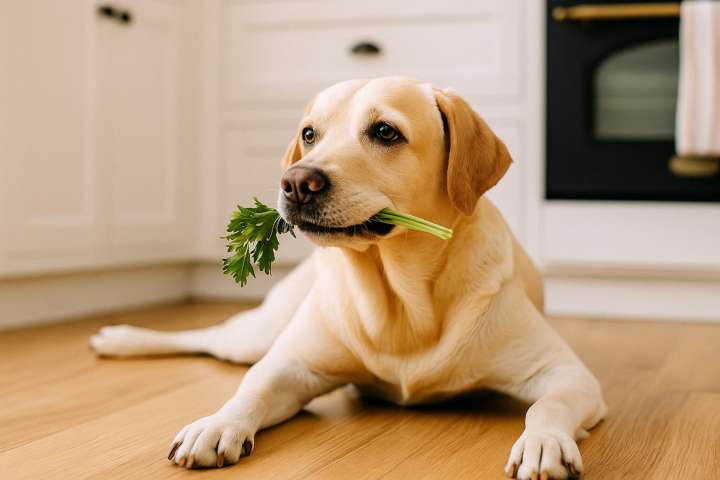When your dog has an upset stomach—whether it’s vomiting, diarrhea, gas, or loss of appetite—it can be worrying. But not every case needs a trip to the vet or medication. In many mild situations, natural remedies can help soothe your dog’s digestive system gently and effectively.
In this guide, you’ll discover vet-approved home remedies for minor stomach issues, what ingredients to avoid, and when to seek medical help.
🐶 Common Signs of an Upset Stomach in Dogs
Mild digestive discomfort may cause:
- Vomiting (once or twice)
- Diarrhea or soft stool
- Loss of appetite
- Gurgling stomach sounds
- Licking lips or swallowing frequently
- Eating grass
- Mild bloating or gas
- Restlessness or lethargy
If symptoms are severe, persistent, or worsening, skip the home care and see a vet immediately.
✅ Natural Remedies to Soothe Your Dog’s Stomach
1. Fasting (12–24 Hours)
Letting the digestive tract rest is often the first step in recovery.
- For adult dogs: Withhold food for up to 12–24 hours (but always provide water)
- For puppies or toy breeds: Ask your vet—shorter fasts may be safer due to blood sugar risk
After fasting, reintroduce food with a bland diet.
2. Bland Diet: Boiled Chicken and White Rice
One of the safest go-to meals after GI upset:
- Boiled chicken breast (no skin or seasoning)
- White rice or plain mashed pumpkin (no sugar or spices)
- Feed small portions, 2–3 times a day for 2–3 days
- Slowly transition back to regular food over 3–5 days
Other bland options: turkey, low-fat cottage cheese, or baby food (Stage 1 meat, no garlic or onion)
3. Canned Plain Pumpkin (Not Pie Mix)
Pumpkin is rich in soluble fiber and helps with both diarrhea and constipation.
- Add 1–2 teaspoons for small dogs, or 1–2 tablespoons for large dogs
- Mix into bland food or give alone
- Helps regulate digestion and soothe inflammation
Make sure it’s 100% pure pumpkin, not pie filling with added sugars or spices.
4. Slippery Elm Bark (Herbal Supplement)
This natural herb coats the digestive tract and may help reduce inflammation, diarrhea, and acid reflux.
- Available as powder, capsules, or tincture
- Choose pet-safe formulations only
- Consult your vet for correct dosage by weight
5. Bone Broth (Unsalted and Homemade)
Bone broth is gentle, hydrating, and nutrient-rich—perfect if your dog won’t eat solid food.
- Use homemade broth made from plain bones (no onions, garlic, or seasoning)
- Cool and skim the fat before serving
- Serve warm in small amounts or over rice
Supports hydration and encourages appetite.
6. Ginger (In Small Doses)
Ginger may help reduce nausea, gas, and cramping.
- Boil peeled, sliced ginger root in water for 10–15 minutes
- Cool and offer 1–2 teaspoons of the tea for small dogs, up to 2 tablespoons for large dogs
- Give once or twice per day during digestive upset
Avoid ginger-based supplements unless approved by your vet.
7. Probiotics
Good bacteria support gut health and recovery from stomach upset.
- Choose a dog-specific probiotic or vet-recommended product
- Can help after antibiotics, stress, or diet changes
- Yogurt can be used occasionally, but only plain and unsweetened (check for xylitol-free)
Probiotics can also be used preventively to maintain healthy digestion.
🛑 What to Avoid During a Dog’s Stomach Upset
- Fatty or spicy foods
- Table scraps or dairy
- Raw food (during active digestive upset)
- Treats with artificial coloring, grains, or fillers
- Over-the-counter human medications (like Pepto-Bismol or Imodium) without explicit vet approval
- Essential oils or herbal remedies not designed for dogs
⚠️ When to Call the Vet
Seek professional help if your dog:
- Vomits more than twice in 24 hours
- Has bloody stool or vomit
- Shows signs of dehydration (sunken eyes, dry gums, lethargy)
- Refuses food for more than 24 hours
- Has a bloated or hard abdomen
- Is a puppy, senior, or has pre-existing health conditions
- Seems in pain or distressed
Conclusion
A mild upset stomach is common in dogs—and often manageable with natural, gentle care at home. From pumpkin and ginger to fasting and probiotics, the remedies above can help your dog feel better quickly. But always keep an eye on symptoms, and don’t hesitate to call your vet when something feels off.
Want a printable “Stomach Soothing Protocol” and safe foods list? Visit our Dog Digestive Wellness Hub for home care guides and emergency checklists.

